Restaurant manager Restaurant management • Administration

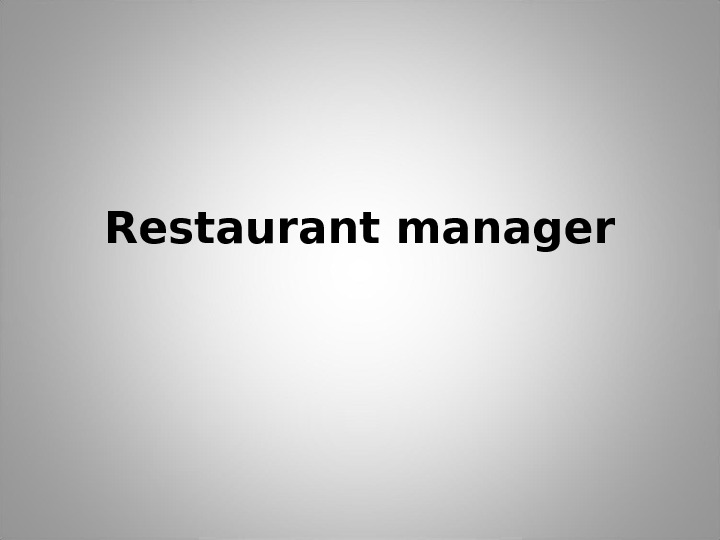
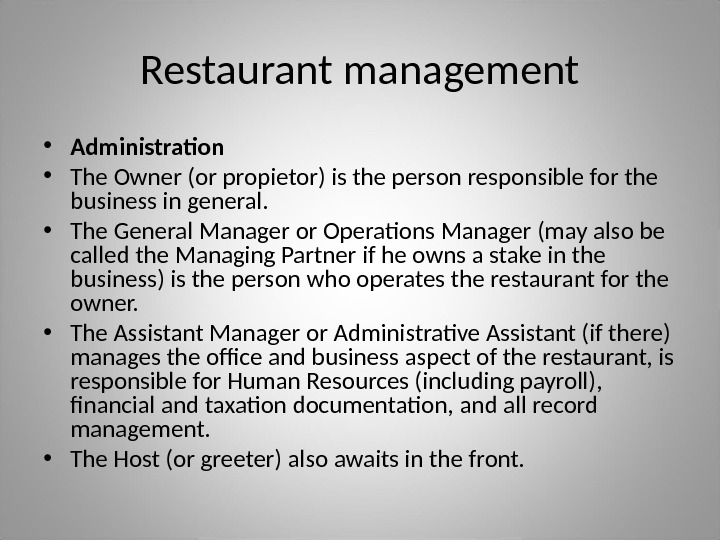
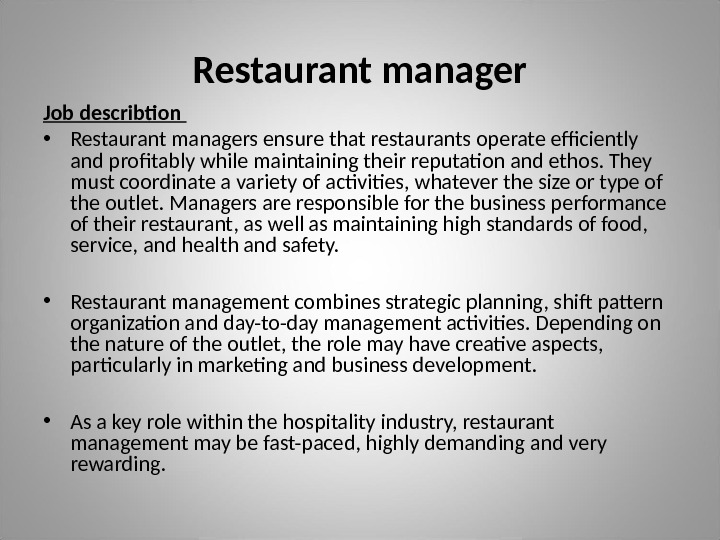
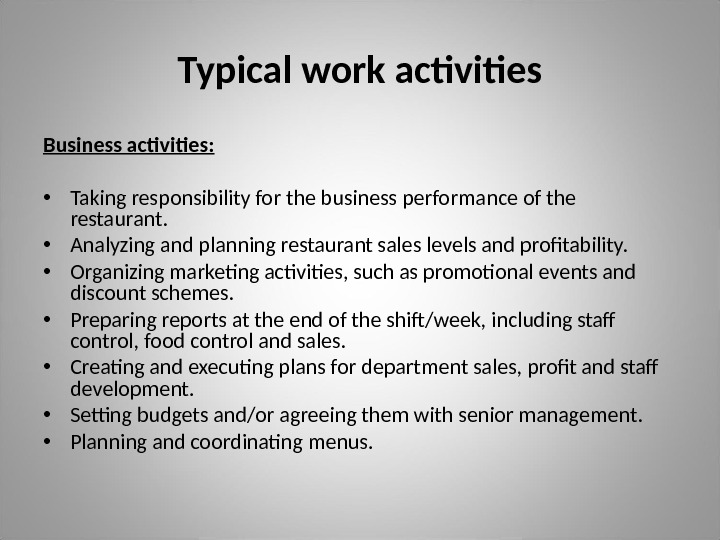
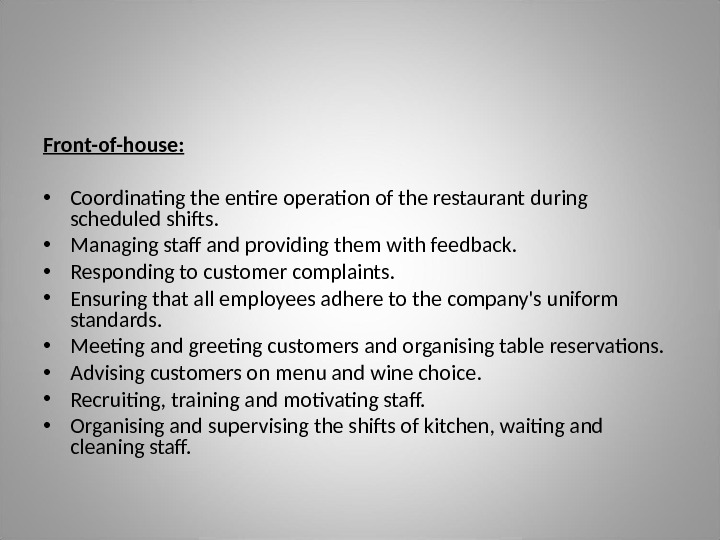
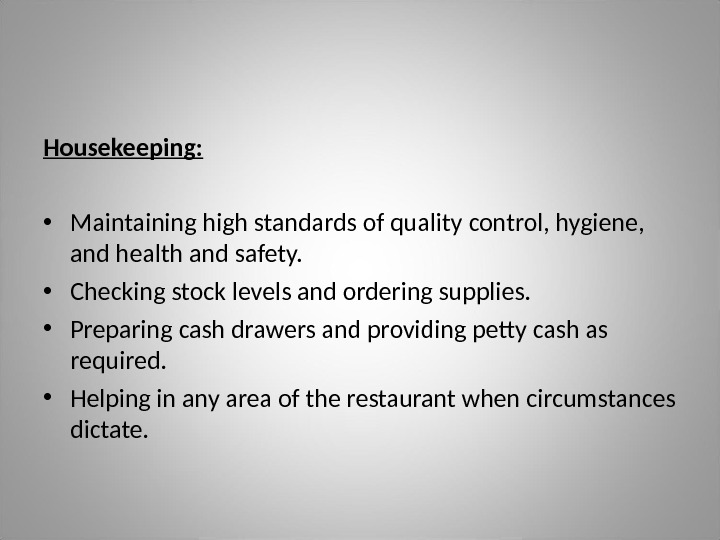
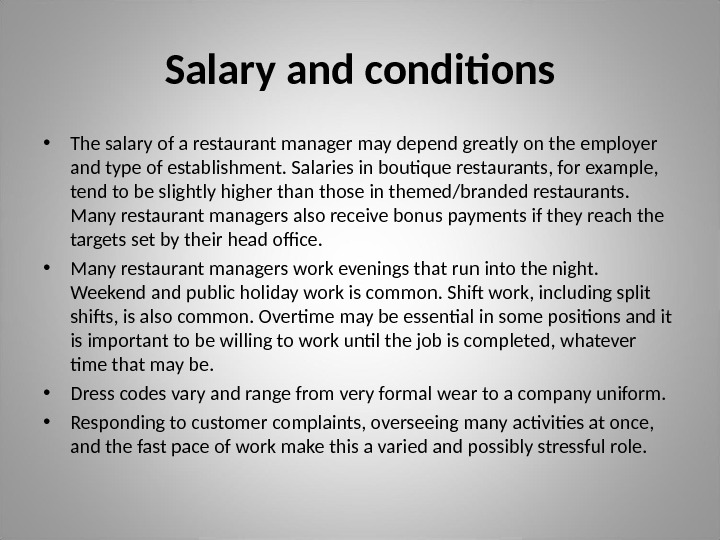
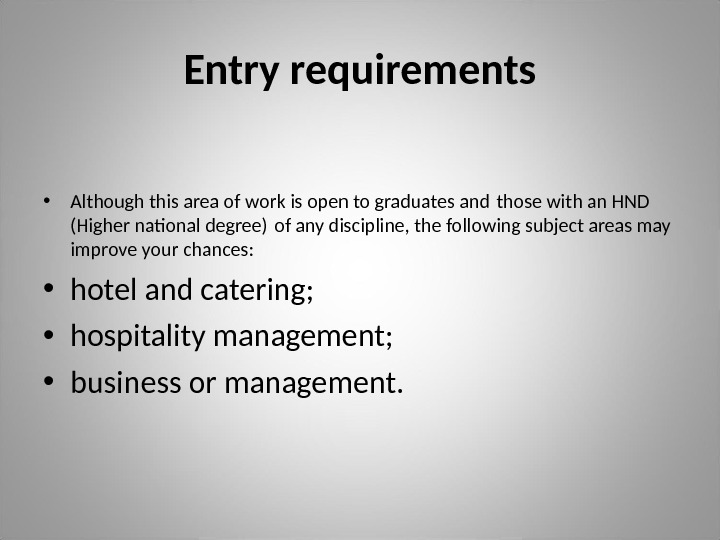
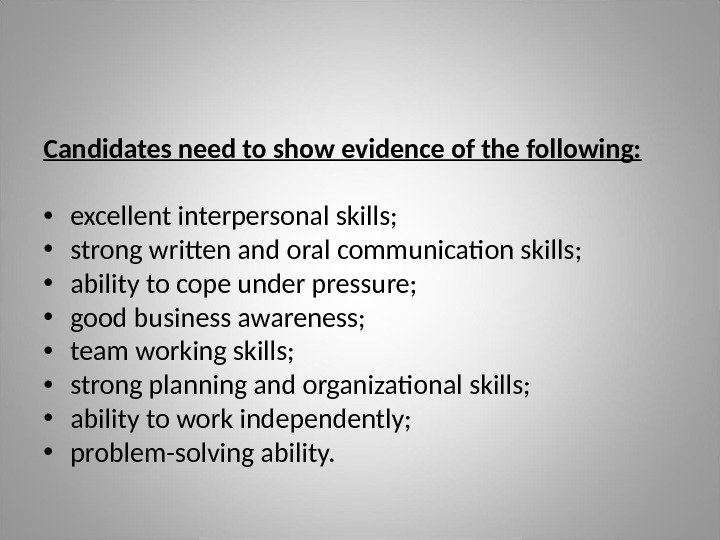
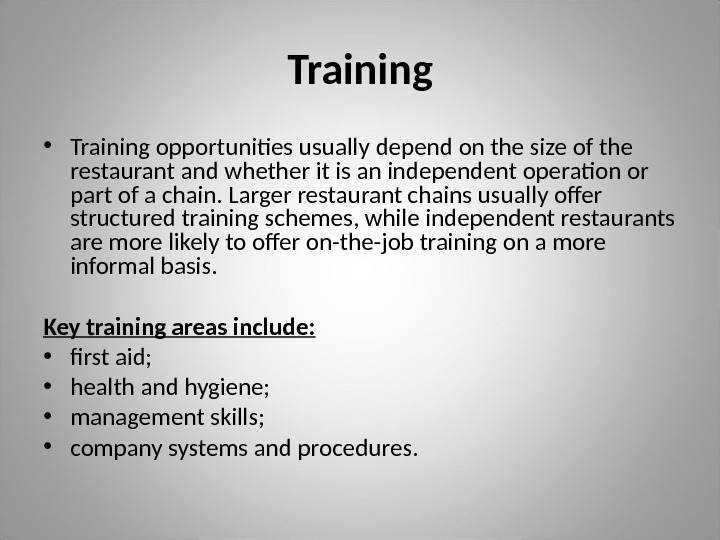
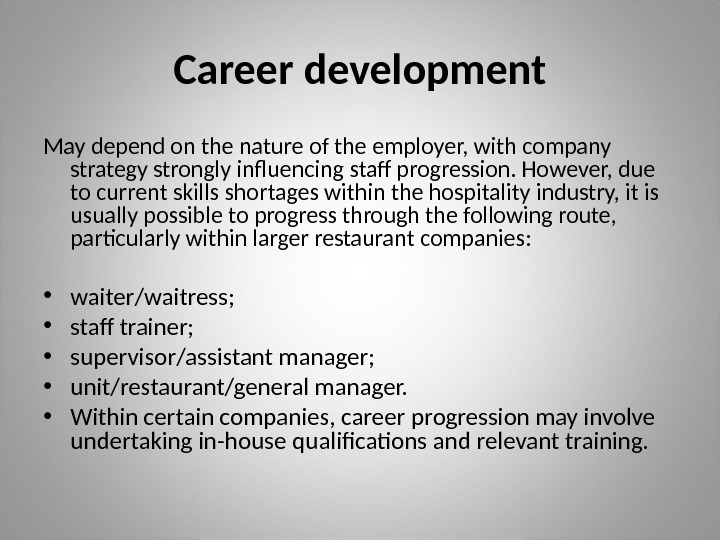

managerial_experiences.ppt
- Размер: 189.5 Кб
- Количество слайдов: 12
Описание презентации Restaurant manager Restaurant management • Administration по слайдам
 Restaurant manager
Restaurant manager
 Restaurant management • Administration • The Owner (or propietor) is the person responsible for the business in general. • The General Manager or Operations Manager (may also be called the Managing Partner if he owns a stake in the business) is the person who operates the restaurant for the owner. • The Assistant Manager or Administrative Assistant (if there) manages the office and business aspect of the restaurant, is responsible for Human Resources (including payroll), financial and taxation documentation, and all record management. • The Host (or greeter) also awaits in the front.
Restaurant management • Administration • The Owner (or propietor) is the person responsible for the business in general. • The General Manager or Operations Manager (may also be called the Managing Partner if he owns a stake in the business) is the person who operates the restaurant for the owner. • The Assistant Manager or Administrative Assistant (if there) manages the office and business aspect of the restaurant, is responsible for Human Resources (including payroll), financial and taxation documentation, and all record management. • The Host (or greeter) also awaits in the front.
 Restaurant manager Job describtion • Restaurant managers ensure that restaurants operate efficiently and profitably while maintaining their reputation and ethos. They must coordinate a variety of activities, whatever the size or type of the outlet. Managers are responsible for the business performance of their restaurant, as well as maintaining high standards of food, service, and health and safety. • Restaurant management combines strategic planning, shift pattern organization and day-to-day management activities. Depending on the nature of the outlet, the role may have creative aspects, particularly in marketing and business development. • As a key role within the hospitality industry, restaurant management may be fast-paced, highly demanding and very rewarding.
Restaurant manager Job describtion • Restaurant managers ensure that restaurants operate efficiently and profitably while maintaining their reputation and ethos. They must coordinate a variety of activities, whatever the size or type of the outlet. Managers are responsible for the business performance of their restaurant, as well as maintaining high standards of food, service, and health and safety. • Restaurant management combines strategic planning, shift pattern organization and day-to-day management activities. Depending on the nature of the outlet, the role may have creative aspects, particularly in marketing and business development. • As a key role within the hospitality industry, restaurant management may be fast-paced, highly demanding and very rewarding.
 Typical work activities Business activities: • Taking responsibility for the business performance of the restaurant. • Analyzing and planning restaurant sales levels and profitability. • Organizing marketing activities, such as promotional events and discount schemes. • Preparing reports at the end of the shift/week, including staff control, food control and sales. • Creating and executing plans for department sales, profit and staff development. • Setting budgets and/or agreeing them with senior management. • Planning and coordinating menus.
Typical work activities Business activities: • Taking responsibility for the business performance of the restaurant. • Analyzing and planning restaurant sales levels and profitability. • Organizing marketing activities, such as promotional events and discount schemes. • Preparing reports at the end of the shift/week, including staff control, food control and sales. • Creating and executing plans for department sales, profit and staff development. • Setting budgets and/or agreeing them with senior management. • Planning and coordinating menus.
 Front-of-house: • Coordinating the entire operation of the restaurant during scheduled shifts. • Managing staff and providing them with feedback. • Responding to customer complaints. • Ensuring that all employees adhere to the company’s uniform standards. • Meeting and greeting customers and organising table reservations. • Advising customers on menu and wine choice. • Recruiting, training and motivating staff. • Organising and supervising the shifts of kitchen, waiting and cleaning staff.
Front-of-house: • Coordinating the entire operation of the restaurant during scheduled shifts. • Managing staff and providing them with feedback. • Responding to customer complaints. • Ensuring that all employees adhere to the company’s uniform standards. • Meeting and greeting customers and organising table reservations. • Advising customers on menu and wine choice. • Recruiting, training and motivating staff. • Organising and supervising the shifts of kitchen, waiting and cleaning staff.
 Housekeeping: • Maintaining high standards of quality control, hygiene, and health and safety. • Checking stock levels and ordering supplies. • Preparing cash drawers and providing petty cash as required. • Helping in any area of the restaurant when circumstances dictate.
Housekeeping: • Maintaining high standards of quality control, hygiene, and health and safety. • Checking stock levels and ordering supplies. • Preparing cash drawers and providing petty cash as required. • Helping in any area of the restaurant when circumstances dictate.
 Salary and conditions • The salary of a restaurant manager may depend greatly on the employer and type of establishment. Salaries in boutique restaurants, for example, tend to be slightly higher than those in themed/branded restaurants. Many restaurant managers also receive bonus payments if they reach the targets set by their head office. • Many restaurant managers work evenings that run into the night. Weekend and public holiday work is common. Shift work, including split shifts, is also common. Overtime may be essential in some positions and it is important to be willing to work until the job is completed, whatever time that may be. • Dress codes vary and range from very formal wear to a company uniform. • Responding to customer complaints, overseeing many activities at once, and the fast pace of work make this a varied and possibly stressful role.
Salary and conditions • The salary of a restaurant manager may depend greatly on the employer and type of establishment. Salaries in boutique restaurants, for example, tend to be slightly higher than those in themed/branded restaurants. Many restaurant managers also receive bonus payments if they reach the targets set by their head office. • Many restaurant managers work evenings that run into the night. Weekend and public holiday work is common. Shift work, including split shifts, is also common. Overtime may be essential in some positions and it is important to be willing to work until the job is completed, whatever time that may be. • Dress codes vary and range from very formal wear to a company uniform. • Responding to customer complaints, overseeing many activities at once, and the fast pace of work make this a varied and possibly stressful role.
 Entry requirements • Although this area of work is open to graduates and those with an HND (Higher national degree) of any discipline, the following subject areas may improve your chances: • hotel and catering; • hospitality management; • business or management.
Entry requirements • Although this area of work is open to graduates and those with an HND (Higher national degree) of any discipline, the following subject areas may improve your chances: • hotel and catering; • hospitality management; • business or management.
 Candidates need to show evidence of the following: • excellent interpersonal skills; • strong written and oral communication skills; • ability to cope under pressure; • good business awareness; • team working skills; • strong planning and organizational skills; • ability to work independently; • problem-solving ability.
Candidates need to show evidence of the following: • excellent interpersonal skills; • strong written and oral communication skills; • ability to cope under pressure; • good business awareness; • team working skills; • strong planning and organizational skills; • ability to work independently; • problem-solving ability.
 Training • Training opportunities usually depend on the size of the restaurant and whether it is an independent operation or part of a chain. Larger restaurant chains usually offer structured training schemes, while independent restaurants are more likely to offer on-the-job training on a more informal basis. Key training areas include: • first aid; • health and hygiene; • management skills; • company systems and procedures.
Training • Training opportunities usually depend on the size of the restaurant and whether it is an independent operation or part of a chain. Larger restaurant chains usually offer structured training schemes, while independent restaurants are more likely to offer on-the-job training on a more informal basis. Key training areas include: • first aid; • health and hygiene; • management skills; • company systems and procedures.
 Career development M ay depend on the nature of the employer, with company strategy strongly influencing staff progression. However, due to current skills shortages within the hospitality industry, it is usually possible to progress through the following route, particularly within larger restaurant companies: • waiter/waitress; • staff trainer; • supervisor/assistant manager; • unit/restaurant/general manager. • Within certain companies, career progression may involve undertaking in-house qualifications and relevant training.
Career development M ay depend on the nature of the employer, with company strategy strongly influencing staff progression. However, due to current skills shortages within the hospitality industry, it is usually possible to progress through the following route, particularly within larger restaurant companies: • waiter/waitress; • staff trainer; • supervisor/assistant manager; • unit/restaurant/general manager. • Within certain companies, career progression may involve undertaking in-house qualifications and relevant training.
 Thank you for attention.
Thank you for attention.

